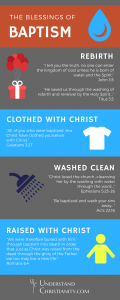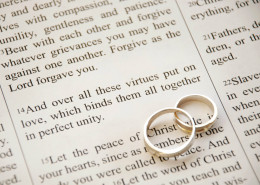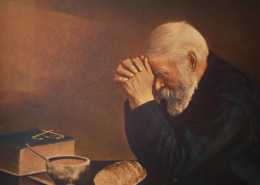One of the greatest blessings God has given Christians is baptism. Baptism is the act of one person applying water to someone else while speaking the words “I baptize you in the name of the Father and of the Son and of the Holy Spirit.” While the mode of applying water in baptism varies from a simple sprinkling on the forehead to immersing someone’s whole body, the effect of saying those words while applying water is extremely significant for Christians.
Water and the Word
What’s the big deal about someone applying water to someone else? The water isn’t what makes baptism so special. While the water certainly paints the picture of sins being washed away, a person being baptized “in the name of the Father, and of the Son, and of the Holy Spirit” is receiving what that name means: the blessing of the Holy Trinity who has planned and carried out our salvation from sin (see the sections Justified by Grace through Faith and The Trinity for more information). The apostle Paul describes baptism as “the washing with water through the Word” (Ephesians 5:26). Baptizing someone is applying water and God’s Word, God’s message of forgiveness, to the person being baptized. That is why baptism is sometimes referred to as the “visible Word,” because it is essentially a physical application of the gospel message (another example of this is The Lord’s Supper).
The Blessings of Baptism
Since the Word of God and the gospel message it proclaims are applied in a baptism, we know that baptism grants the forgiveness of sins (Mark 1:4; Luke 3:3; Acts 2:38). God tells us that his Word is “living and active” (Hebrews 4:12) and “it is the power of God for the salvation of everyone who believes” (Romans 1:16; see also the section The Bible is the Word of God). Therefore, applying God’s Word in baptism does the same thing as proclaiming God’s Word: it gives the promise of forgiveness in Christ. The apostle Peter stated: “Baptism…now saves you also—not the removal of dirt from the body but the pledge of a good conscience toward God. It saves you by the resurrection of Jesus Christ” (1 Peter 3:21). Baptism saves us. It washes away the guilt of sin from our consciences and points to Jesus’ resurrection as proof that the guilt has been removed (see The Resurrection).
“Go and make disciples of all nations, baptizing them in the name of the Father and of the Son and of the Holy Spirit.”
Matthew 28:19
Since the Word of God is present in baptism, through it the Holy Spirit also works faith. No one can have faith without the Holy Spirit: “I tell you that no one who is speaking by the Spirit of God says, ‘Jesus be cursed,’ and no one can say, ‘Jesus is Lord,’ except by the Holy Spirit” (1 Corinthians 12:3). Baptism gives the gift of the Holy Spirit. As Peter said to a group of people in Jerusalem, “Repent and be baptized, every one of you, in the name of Jesus Christ for the forgiveness of your sins. And you will receive the gift of the Holy Spirit” (Acts 2:38). The Holy Spirit is active in baptism, granting faith to the person being baptized.
The apostle Paul also speaks of the forgiveness of sins and the activity of the Holy Spirit in baptism. He declared, “All of you who were baptized into Christ have clothed yourselves with Christ” (Galatians 3:27), and, “We were all baptized by one Spirit into one body (of Christ)…and we were all given the one Spirit to drink” (1 Corinthians 12:13). He again says, “There is one body and one Spirit—just as you were called to one hope when you were called—one Lord, one faith, one baptism; one God and Father of all, who is over all and through all and in all” (Ephesians 4:4-5). He says that God “saved us through the washing of rebirth and renewal by the Holy Spirit, whom he poured out on us generously through Jesus Christ our Savior” (Titus 3:5-6). Forgiveness of sins and faith are being given through baptism by the Holy Spirit in the name of the One who graciously died for us. Paul again stresses this when he says, “Don’t you know that all of us who were baptized into Christ Jesus were baptized into his death? We were therefore buried with him through baptism into death in order that, just as Christ was raised from the dead through the glory of the Father, we too may live a new life” (Romans 6:3-4). Baptism connects the person being baptized to Christ’s death on the cross where he died for the sins of the world. It also washes clean and resurrects our souls from spiritual death into faith so we can live a new sanctified life for God.
Baptism, a Daily Blessing
Christ himself commanded baptism when he gave his Great Commission, his sending out of Christians after his resurrection to preach the gospel message to the whole world. He said, “Go and make disciples of all nations, baptizing them in the name of the Father and of the Son and of the Holy Spirit” (Matthew 28:19). Why would he command it? Because he loves us and he knows what a blessing it is for believers. He knows what we’re up against in this world: our sinful natures inside of us and the sinful world outside of us, with Satan accusing us of our sin every single day trying to make us feel ashamed of approaching God. What a blessing it is for a Christian to look back at their baptism and know they’ve been forgiven! If someone was baptized, then they were baptized—it happened. And if it happened, Satan can never take that away.
“All of you who were baptized into Christ have clothed yourselves with Christ.”
Galatians 3:27
That’s why baptism is a daily blessing from God. Not that we should get re-baptized every day, because one baptism is enough to forgive all of our sins, but baptism can serve as a daily assurance of the forgiveness we have. Whenever we feel grief because of our sin or are ever unsure of whether God has really forgiven us, we can remember our baptism and remind ourselves he has forgiven us through baptism—he promised it. Think of it as someone being given an autograph with a letter of authenticity. No matter what others say, the owner knows the signature is real. In the same way, God writes his own name on our hearts through faith in Christ, and baptism serves as our letter of authenticity that tells us God has indeed written his name on our hearts, the name that promises and brings forgiveness—the name someone proclaims when applying water in a baptism.
Why Water?
Why does God want us to use water in baptism and not something else? When people wash things they usually wash them with water, so a pretty basic picture of sins being washed away is painted for those being baptized and for those witnessing a baptism. The earth is also mostly covered with water, making it a convenient resource for a blessing God wants us to have. And we human beings are also very sense-oriented physically, and the feel and sight of water being poured over one’s skin can have a lasting impact on those experiencing baptism. One could see many reasons why God would choose to have us use water.
For All Nations
Who then can be baptized? Jesus told us, “Go and make disciples of all nations” (Matthew 28:19), and the Bible records a few instances where whole households have been baptized (Acts 16:13-15, 25-34; 1 Corinthians 1:16). With adults, we want to instruct them before we baptize them because that was Biblical practice (e.g., Acts 8:12, 8:26-40, 10:44-48, 16:13-15, 16:25-34, 18:7-8) and so they understand what they are receiving in baptism (i.e., what Christ did for them). With infants, we baptize them and then instruct them so that God might give them faith and nourish and sustain that faith.
“Let the little children come to me, and do not hinder them, for the kingdom of God belongs to such as these.”
Luke 18:16
There are many Christians who do not baptize infants because they believe infants cannot have faith and understand what is happening. However, this is a confusion of faith and mental knowledge. Mental knowledge is of the brain, but faith rests in the soul. Jesus himself got angry at his disciples for preventing children (literally “infants” in the original language—Luke 18:15) from being brought to him and he said, “Let the little children come to me, and do not hinder them, for the kingdom of God belongs to such as these” (Matthew 19:14; Mark 10:14; Luke 18:16; the kingdom of God refers to the kingdom of believers). Others say infants don’t need baptism because they’re not sinful, but that is a misunderstanding of the wide-reaching effects of sin (see Sin and Repentance). Therefore, since Jesus commanded that “all nations” be baptized, whole households were baptized in the early church, Jesus said they belong in the kingdom of God, and they need the forgiveness of sins just like adults do, that means we are to baptize infants.
While simple water being applied to someone doesn’t bring any lasting benefits, the Word of God being physically applied to someone certainly does. The gracious blessing of our God forgiving our sins through baptism shows the power of his Word and the daily, personal connection he desires to make with each and every one of us through Christ. “Christ loved the church and gave himself up for her to make her holy, cleansing her by the washing with water through the Word, and to present her to himself as a radiant church, without stain or wrinkle or any other blemish, but holy and blameless” (Ephesians 5:25-27). Having been buried with him through baptism, we can confidently approach him with clean consciences and look forward to our eternal dwelling with God in the name of the Father and of the Son and of the Holy Spirit.






